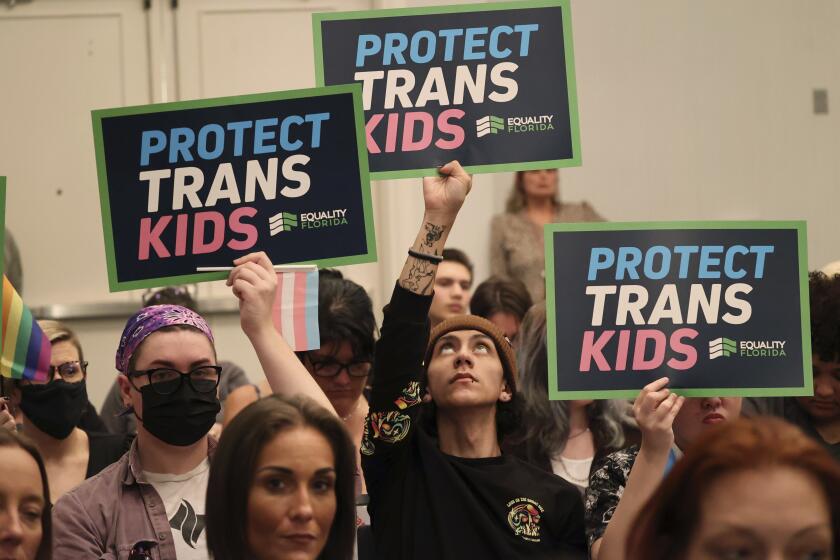Take it from a nonbinary professor: Don’t make students state their pronouns on Day One

- Share via
Like clockwork, as we return to school, our classrooms will fall into gender pronoun controversies. The inclusive impulse on Day One is to have everyone in class introduce themselves and share their pronouns, so nobody is singled out. But many don’t think about pronouns. Even for me, as a nonbinary law professor who uses “they,” it’s never easy. Others must feel even more awkward when prompted to share their preferences. Hounded by the pronoun police and the gender warriors, what are we to do? My answer? Radical empathy.
I practiced by becoming kinder to myself — and others — over recent decades about gender.
Twenty-five years ago, beatings in a school restroom led to a landmark court ruling. And yet last month, another LGBTQ+ teen was beaten in a bathroom and died.
It sure is liberating to see “nonbinary” and “they/them” show up everywhere now, even on buttons and earrings. I grew up without this in-between gender. Singular “they” made no sense then to most people. “Pat” drew laughs every week on “Saturday Night Live” because nobody could determine their gender. Nonbinary people were literally a national running joke. As a kid, I felt especially obligated to laugh along.
Happily, much has changed. Most try to speak inclusively. How we got here is very fraught, though, and the rest of the journey is treacherous too. Some make honest mistakes. Others actively resist inclusion. State bans on discussion of gender identity in public schools certainly haven’t solved anything; they only complicate the everyday challenge of getting pronouns right.
Forcing California teachers to notify parents that their kids are transgender would be harmful. Conservatives should stop wasting time on issues that hurt public education.
In whatever settings in which we find ourselves, should we police pronouns? My answer is a hearty no. The process of inclusion matters just as much as the result. To be inclusive, we must bring people in — not shame them into it.
When I start teaching a class, I don’t insist on pronoun identification. When I stand before my class with my mannish body in women’s clothes, students know the score. But I want to make it clear that my classroom is a safe space where people can identify, or not. Explicitly bringing up preferred pronouns can scare people away from sincere and open conversations about gender. Those will happen organically.
The few people who deliberately misgender deserve vitriol. Many more cisgender people simply don’t understand the importance of pronouns. They are still learning. We can expect — even insist on — inclusive language, and correct mistakes. But shaming will not advance social change. As any teacher or parent knows, encouragement drives learning more than criticism and fear.
While teaching, I’ve accidentally referred to myself as “he” and misgendered students. Mistakes happen. I’m trying, and so are others.
Along that journey, we desperately need nuanced discussions about why gender goes beyond “m” or “f.” Even “they” can confuse, and it’s been a singular personal pronoun for centuries. When my daughter is speaking to my mother and refers to an individual as “they,” my mom wonders what group of people is meant. “They” requires an adjustment in thinking. Not just to the maladroit grammar of saying “they is.”
Though I wore dresses throughout law school in the early 1990s and criticized the “gender binary,” I accepted that I was nonbinary only a few years ago. While liberating, it can be hard to be proud of “nonbinary” when the term is itself a negation. It feels like just adding a third checkbox, when we instead need gender to reflect the complexity of human reality.
When people meet me, often I encounter confusion and even fear: Sometimes I later learn that an individual was afraid of offending me, when they wanted to ask me about why and how I live beyond the gender binary. The fear of causing offense may encourage people to try to get it right. Unfortunately, it could also stifle curiosity about gender differences.
When someone calls me “he” but seems sincere, I try not to experience it as a “dysphoric moment.” Many people need to hear “they” multiple times to internalize the preference. This was certainly true for me, even though it’s my preferred pronoun. It’s my own struggle that leads me to insist on patience for others. The gender binary has been taught to us all; I am empathetic to anyone who wants to unlearn it.
Younger people shouldn’t have to go through the struggles that plagued me. When pronouns come up, that should be a moment for conversation, exchange and trust-building. People shouldn’t refer to me as “they” out of fear, but out of understanding and respect. It is only through spreading this compassion that we can permanently shift how we understand gender. If “Saturday Night Live” can change, so can everyone. In the end, when we get weary, like Otis Redding says, we should all try a little tenderness.
Darren Rosenblum is a professor of law at McGill University.
More to Read
A cure for the common opinion
Get thought-provoking perspectives with our weekly newsletter.
You may occasionally receive promotional content from the Los Angeles Times.











